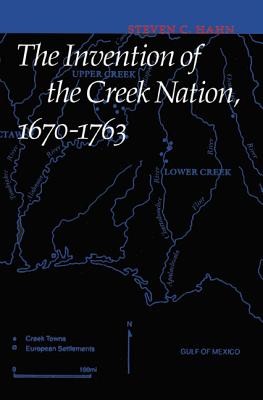
- We will send in 10–14 business days.
- Author: Steven C Hahn
- Publisher: University of Nebraska Press
- ISBN-10: 0803262930
- ISBN-13: 9780803262935
- Format: 15.6 x 23 x 2.2 cm, softcover
- Language: English
- SAVE -10% with code: EXTRA
Reviews
Description
Drawing on archaeological evidence and often-neglected Spanish source material, The Invention of the Creek Nation, 1670-1763 explores the political history of the Creek Indians of Georgia and Alabama and the emergence of the Creek Nation during the colonial era in the American Southeast. In part a study of Creek foreign relations, this book examines the creation and application of the "neutrality" policy-defined here as the Coweta Resolution of 1718-for which the Creeks have long been famous, in an era marked by the imperial struggle for the American South. Also a study of the culture of internal Creek politics, this work shows the persistence of a "traditional" kinship-based political system in which town and clan affiliation remained supremely important. These traditions, coupled with political intrusions by the region's three European powers, promoted the spread of Creek factionalism and mitigated the development of a regional Creek Confederacy. But while traditions endured, the struggle to maintain territorial integrity against Britain also promoted political innovation. In this context the territorially defined Creek Nation emerged as a legal concept in the era of the French and Indian War, as imperial policies of an earlier era gave way to the territorial politics that marked the beginning of a new one. Steven C. Hahn is a professor of history at St. Olaf College. He is the author of The Life and Times of Mary Musgrove.
EXTRA 10 % discount with code: EXTRA
The promotion ends in 7d.15:31:30
The discount code is valid when purchasing from 10 €. Discounts do not stack.
- Author: Steven C Hahn
- Publisher: University of Nebraska Press
- ISBN-10: 0803262930
- ISBN-13: 9780803262935
- Format: 15.6 x 23 x 2.2 cm, softcover
- Language: English English
Drawing on archaeological evidence and often-neglected Spanish source material, The Invention of the Creek Nation, 1670-1763 explores the political history of the Creek Indians of Georgia and Alabama and the emergence of the Creek Nation during the colonial era in the American Southeast. In part a study of Creek foreign relations, this book examines the creation and application of the "neutrality" policy-defined here as the Coweta Resolution of 1718-for which the Creeks have long been famous, in an era marked by the imperial struggle for the American South. Also a study of the culture of internal Creek politics, this work shows the persistence of a "traditional" kinship-based political system in which town and clan affiliation remained supremely important. These traditions, coupled with political intrusions by the region's three European powers, promoted the spread of Creek factionalism and mitigated the development of a regional Creek Confederacy. But while traditions endured, the struggle to maintain territorial integrity against Britain also promoted political innovation. In this context the territorially defined Creek Nation emerged as a legal concept in the era of the French and Indian War, as imperial policies of an earlier era gave way to the territorial politics that marked the beginning of a new one. Steven C. Hahn is a professor of history at St. Olaf College. He is the author of The Life and Times of Mary Musgrove.


Reviews